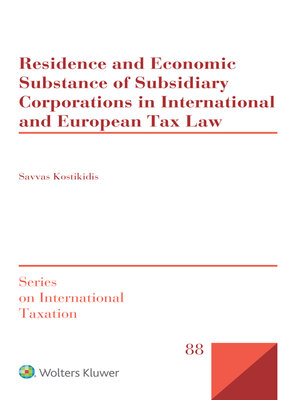Residence and Economic Substance of Subsidiary Corporations in International and European Tax Law
ebook ∣ Series on International Taxation
By Savvas Kostikidis

Sign up to save your library
With an OverDrive account, you can save your favorite libraries for at-a-glance information about availability. Find out more about OverDrive accounts.
Find this title in Libby, the library reading app by OverDrive.



Search for a digital library with this title
Title found at these libraries:
| Library Name | Distance |
|---|---|
| Loading... |
Series on International Taxation
Residence and Economic Substance of Subsidiary Corporations in International and European Tax Law
It is well known that multinational corporations establish foreign subsidiaries in great measure to reduce their worldwide tax burden. This groundbreaking book examines the content of the substance requirement in double tax convention residence rules, transfer pricing rules, anti-abuse rules, and controlled foreign corporation rules in the context of international and EU tax law, disentangling the complex relationship between the substance requirements in these four sets of legal rules.
Following a descriptive-analytic method, for each substance requirement of the four sets of legal rules, the discussion deals with the content of economic substance in complex scenarios, for example:
holding companies;
special purpose vehicles;
loss-making subsidiaries;
subsidiaries with management in more than one state;
subsidiaries managed by the parent company;
outsourcing; and
subsidiaries 'borrowing' the substance of other group companies.
The author introduces a new method of assessment of substance requirements, offering practical solutions for their uniform application in international and European tax law.
In its thorough examination of how substance requirements work and how they are interrelated among different sets of tax rules, this book has no peers. It will be welcomed by taxation practitioners and corporate counsel in Europe and worldwide.







